MercoPress. South Atlantic News Agency
Tag: recession
-
Wednesday, October 24th 2018 - 08:40 UTC
Argentine Peso slips on Tuesday; central bank sells debt notes at a rate of 71.39%

Argentina’s peso slipped on Tuesday, a day after the central bank’s new governor reassured the public that its approach to taming the country’s rocky economy would be sustainable over the medium term. The peso closed 0.46% weaker at 36.65 per U.S. dollar. The currency has fallen 0.30% against the dollar this week, although it has climbed 12.63% since the beginning of the month.
-
Wednesday, October 17th 2018 - 09:16 UTC
Argentine industrial activity contracts 4.1% in August year-to-year

Industrial activity in Argentina dropped 4.1% in August compared to a year ago, completing a 0.8% contraction so far this year, according to a survey by the country's Industrial Union, UIA. However compared to last July industrial production was up 0.7%.
-
Thursday, October 11th 2018 - 08:45 UTC
Macri administration reverses latest cooking gas price increase following public outrage

Argentina will pay for unforeseen increases in the cost of cooking gas following public outrage and opposition in Congress to stymie the plan which would have seen consumers paying increased gas prices in 24 installments from January 2019.
-
Thursday, October 11th 2018 - 08:44 UTC
Argentina attracting more tourists while less Argentines travelling overseas
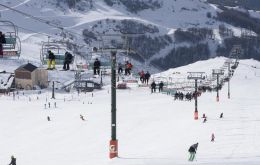
The number of incoming tourists to Argentina is increasing month after month since the drastic devaluation of the local currency, while outgoing tourism has dropped significantly. According to the latest release from the country's stats office, Indec, 224.000 tourists arrived in Argentina during August, 7.4% more than a year ago, while residents travelling overseas dropped 11.9%, to 335.300.
-
Saturday, October 6th 2018 - 09:06 UTC
Brazilian auto industry production hit by Argentine recession

Brazilian automakers are facing the prospect of a sharp drop in exports this year as a crisis in neighboring Argentina hampers the prospects of car sales abroad, the national automakers’ association said on Friday.
-
Friday, October 5th 2018 - 09:03 UTC
Industrial activity in Argentina down 5.6% in August and 0.8% in last 12 months

August data for industry was only a slightly better figure than the previous month – in July, a decline of minus 5.7% was witnessed. In June, the sharpest, most pronounced fall of the year was witnessed: 8.1%, year-on-year.
-
Friday, October 5th 2018 - 08:36 UTC
Argentine Peso slips on Thursday on prospects of higher US interest rates
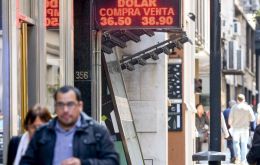
Argentina’s Peso fell on Thursday, pressured by the recession-hit country’s dismal inflation outlook and higher U.S. interest rates that have pushed capital away from riskier emerging markets and toward the greenback, local traders said. The peso shed 1.85% to close at 38.4 per dollar after having gained 9.58% over the previous three days under a freshly-renegotiated International Monetary Fund financing deal that calls for tougher fiscal and monetary policy measures.
-
Monday, October 1st 2018 - 08:56 UTC
Beijing currency swap support for Argentina
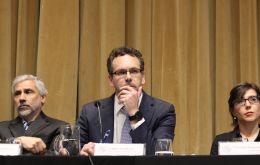
Argentina has “nearly closed” a new currency swap deal with China that will add the equivalent of US$ 9 billion to the South American country’s reserves, the central bank said on Sunday. Argentina and China first agreed to a swap program in 2009 to boost the South American country’s dwindling reserves under former President Cristina Fernandez. Last year, the center-right government of President Mauricio Macri and China agreed to extend the program for three more years.
-
Friday, September 28th 2018 - 08:58 UTC
Brazilian currency strengthens below 4 to the dollar: first time in five weeks
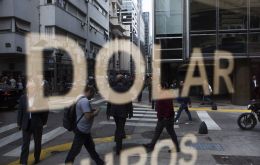
The Brazilian currency dipped under four Real to the dollar for the first time in five weeks at close on Thursday as the markets reacted favorably to the emergence of two clear presidential election frontrunners. The Real closed at 3.99 to the US dollar just two weeks after hitting a record low of almost 4.2 to the dollar -- it's lost around 17% since the start of the year.
-
Thursday, September 13th 2018 - 10:39 UTC
IMF team in Buenos Aires for talks on the standby loan package
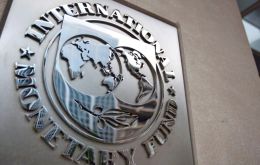
Officials from the International Monetary Fund are in Argentina as part of talks to strengthen and accelerate a crisis loan package, the global lender said Wednesday. The IMF and Buenos Aires agreed in June on a three-year, US$50 billion rescue lending programme but Argentina has since asked for a more rapid disbursement.
